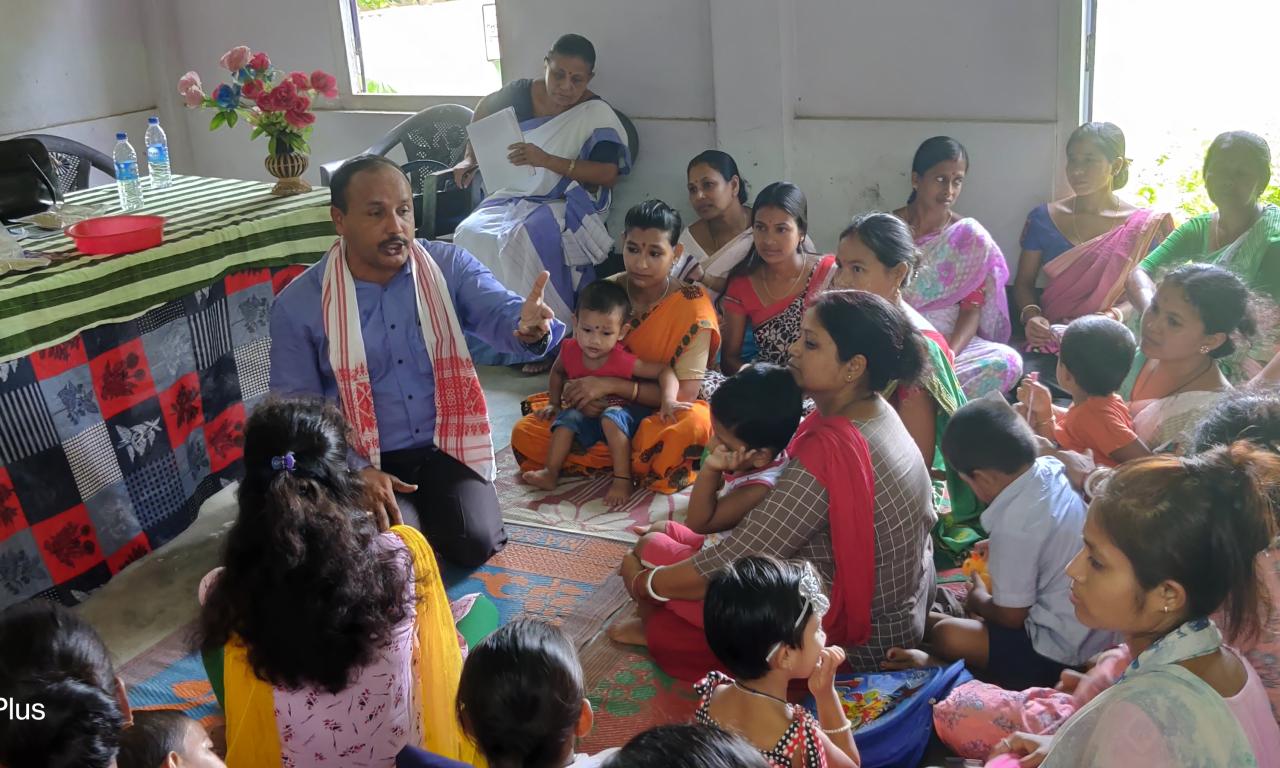
Under the Assam Agribusiness and Rural Transformation Project (APART), WorldFish has spearheaded innovative, community-focused interventions to promote fish-based nutrition and strengthen local engagement in improving dietary diversity and health outcomes. These efforts are helping build sustainable, nutrition-sensitive aquatic food systems from the ground up.
Building Stakeholder Capacity for Sustainable Impact
A key component of the initiative involved organizing 12 comprehensive capacity-building programs that engaged a wide range of stakeholders, including Integrated Child Development Services (ICDS) personnel, District Social Welfare (DSW) representatives, fisheries field staff, Primary Health Centre (PHC) workers, Anganwadi workers, village leaders, community-based organizations, and local NGOs.
The trainings reached 597 participants, equipping them with knowledge on the nutritional benefits of aquatic foods and the vital role of fish consumption in improving health and nutrition. These stakeholders are now actively raising awareness within their communities during routine health and nutrition sessions. They emphasize dietary diversity and advocate for the use of small fish powder, particularly during the critical first 1,000 days of life; period essential for a child’s growth and development.

Community Demonstrations and Awareness Initiatives
Complementing capacity building, WorldFish conducted 46 awareness/demonstration events across Assam, highlighting the benefits of fish consumption and demonstrating simple household preparation of small fish powder. These programs reached nearly 2,500 community members and were supported by Social and Behavioural Change Communication (SBCC) materials, from banners and brochures to TV spots and educational videos, to ensure wide outreach.
Special focus was placed on pregnant and lactating women, adolescent girls, and children—groups most vulnerable to malnutrition. These efforts have strengthened nutrition education and encouraged healthier dietary choices at the household level.
Collaborating with Government for Greater Impact
The success of these grassroots interventions drew the attention of the Department of Social Welfare, Government of Assam, which invited WorldFish and the Department of Fisheries, Assam, to present their learnings at a State-Level Nutrition Workshop.
During the event, WorldFish shared insights from community training, awareness sessions, and participant feedback, engaging senior government officials and partners in meaningful discussions. The team also showcased successful pilot experiences from Odisha and demonstrated practical methods for preparing small fish powder, emphasizing the intervention’s replicability and nutritional impact.

Pilot Success under the Matsya Pariprusti Initiative
Building on this momentum, the Matsya Pariprusti initiative was launched under the theme “Inclusion of Nutrient-Dense Small Fish Powder in the Government ICDS Supplementary Nutrition Program.”
This collaborative pilot—supported by the World Bank-funded APART Project of the ARIAS Society, the Departments of Fisheries and Social Welfare, and the Kamrup District Administration, with technical support from WorldFish—implemented a three-month program integrating small fish powder into children’s meals.
The pilot reached 7,000 children aged 3–6 years across 293 Anganwadi Centres in Kamrup district, incorporating small fish powder into hot cooked meals twice a week. Following its success, the approach expanded to the Boangaon Development Block, reaching an additional 3,300 children aged 3–10 years through 69 Anganwadi Centres and 54 Lower Primary Schools. This phase further demonstrated the effectiveness of small fish powder in enhancing dietary quality among young children.
Scaling Up Local Fish-Based Nutrition Initiatives
The local government is now promoting Small Indigenous Species (SIS) fish seed production by supporting hatchery installations among fisheries farmers across different parts of Assam. Women’s Farmer Producer Groups and small entrepreneurs are being encouraged to produce hygienically dried fish—particularly from locally available small fish—and to develop a variety of value-added products. These groups are also focusing on improved packaging and branding to make such products more widely available in local markets, generating regular income and sustainable livelihoods for rural communities.
The Departments of Women and Child Development, Fisheries, and Health are jointly educating communities about the nutritional and health benefits of small fish consumption through regular awareness programs. Additionally, the government is actively discussing, across departments, the inclusion of small fish-based value-added products under the PM Poshan initiative. Plans are underway to introduce these nutritious products into the mid-day meals of children in Anganwadi centres and schools in a phased manner.
A Model for Replication
Assam’s experience demonstrates the transformative potential of community-led, fish-based nutrition interventions in improving public health and food security. The collaborative approach—uniting government departments, local communities, and technical partners like WorldFish—shows how simple, locally available solutions can create lasting nutritional impact.
This model offers a valuable blueprint for other states and regions seeking to address malnutrition through sustainable, aquatic food-based strategies.
